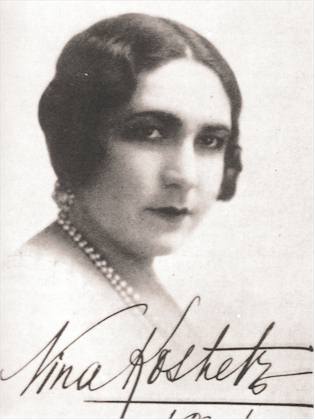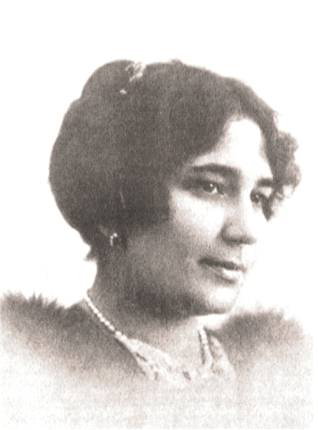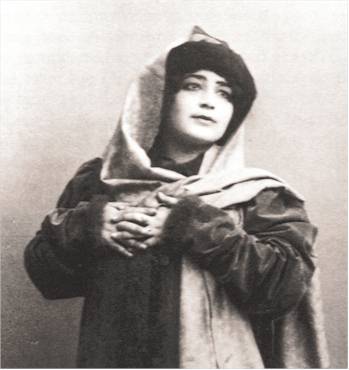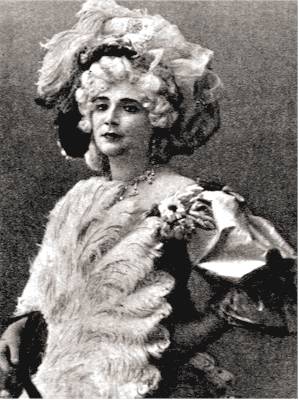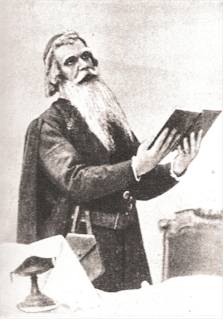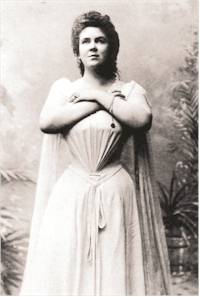(Koshitz), Russian soprano, 1891 - 1965
Biographical notes:
She was born in Kiev and hailed from a musical family. Both of her parents had been stars of the Imperial Opera in Moscow. Her father was the first Siegfried to be heard in Russia. Nina was a
very musical child starting playing the piano with four. She gave her first piano recital at the age of nine! After her father’s suicide she enrolled at the Moscow Conservatory. She studied piano
with Konstantin Igumnoff and Vasily Safonov and composition with Sergei Taneiev. Graduating at 16, she had performed a Rachmaninov concerto for her final recital. She subsequently became
interested in singing and she was eventually instructed by Enzo Masetti and Félia Litvinne. Konstantin Stanislavsky was her coach in dramatic arts. It is not sure when she made her debut.
It seems her real career began with a performance as Tatyana in Eugene Onegin with Zimin’s Opera Company. Until 1917 she appeared there in operas such as The Queen of Spades, The
Tsar’s Bride, The Demon, The Enchanteress, Tosca, Nedda, Marguerite, Nedda and Aida. Like all Russian singers she made lengthy tours to the provinces. She was never invited to the Bolshoi
Theatre! She not only sang opera but gave song recitals. Her fame soon spread and the composers Tcherepnin, Medtner, Gretchaninov and Prokofiev wanted to co-operate with the young singer!
Serge Koussevitzki and Nina Koshetz brought music to the outlying regions, she was his soloist for many years. In 1914 she made her first recordings (only two are known). In 1915 she met
Sergei Rachmaninov and they appeared together in successful recitals, culminating in a romance (the composer was 20 years older than Nina and a married man). He dedicated to her a cycle of
six love songs (op. 38). To avoid a scandal, Rachmaninov retreated and amazingly, they rarely saw each other again. After the Revolution she remained at Zimin’s Opera which had reopened now
under another name. After a stop-over in the Caucasus she eventually arrived in the United States (with husband and child).
She made her official American debut as a soloist with the Detroit Symphony Orchestra under Ossip Gabrilowitch in 1920 and was warmly received. Mary Garden invited her to sing the role of Fata Morgana in Prokofiev’s The Love for Three Oranges. She was now in demand for concerts and recitals by Stokowski, Koussevitzky, Rodzinski and Klemperer. Considered as one of her greatest achievements in the 1920s was the series of four Town Hall recitals celebrating for the most part Russian’s greatest song writers in which Pierre Luboshutz, Walter Damrosch and Samuel Chotzinov all accompanied her. She became the authoritative voice for the Russian emigré composers. In 1924 she returned to Félia Litvinne, now living in Paris and Koshetz received further vocal tuition by the famous soprano. In 1927, commemorating her 15 years in music, she gave a recital devoted entirely to songs dedicated to her. The composer Gretchaninov renewed the collaboration with her and both were enthusiastically admired. Around 1934, she moved to California with her second husband and her daughter (who was becoming a singer too). She opened a Russian restaurant but this venture ended in bankruptcy two years later. By 1942 she opened an elegant music salon in Laguna Beach and taught singing to Marlene Dietrich, Ann Blyth and Claudette Colbert. Her daughter Marina made her successful debut at Town Hall in 1949. Nina Koshetz played some minor roles in films. Her unorthodox lifestyle caused a vocal decline in the late 1930s and ruined slowly but steadily her health. Nina Koshetz died in 1965.
As Nastasia in Tchaikovsky’s “The Enchanteress”
Nina Koshetz as Germaine in Planquette’s operetta “Les Cloches de Corneville” (around 1916), rare photograph Comment: She sang with “a passionate Russian melancholy” and her voice was compared with a Stradivarius
in the hands of a sensitive violinist... Nina Koshetz is a singer of an individual style. “It is partly in the tone, vibrant and shining, partlyin the sheer power and in its contrast with the
softness where this very Russian ice-princess melts, all tenderness. And it is partly in a kind of glamour, which marks also her later recordings, made in 1939, principally of songs by
Rachmaninov...Koshetz clamours with a passionate Russian melancholy, then passes a veil over the voice as a deep sigh comes from the soul in the depths of mortal weariness...” (J.B. Steane). Her voice is of great
sweetness in the upper register, comparable to
In the “Schirmer recordings” you hear a singer in decline, her voice had darkened to a mezzo-soprano, and she was a shadow of herself, but her earlier recordings should not to be missed! My favorite recordings: - In the Quiet of the Night (The Demon / Rubinstein / Aristopia c. 1916) - Berceuse (Volkhova in Sadko / Rimsky-Korsakov / Aristopia c. 1916) - At the Ball (Tchaikovsky / Brunswick 1922/23) - It is Midnight (Lisa in The Queen of Spades / T chaikovsky / Brunswick 1922/23) - Eastern Romance (Rimsky-Korsakov / Brunswick 1922/23) - Why live and suffer alone? (Varlamov / Brunswick 1922/23) - Etude in E (Chopin-Litvinne / Victor 1928) - Yaroslavna’s aria (Yaroslavna in Prince Igor / Borodin / Victor 1928)
- Eili! Eili! (Traditional / Victor 1918) - Estrellita (Ponce / Victor 1928) - Berceuse (Gretchaninov / Victor 1929)
Pavel Alexejevitch Koshitz (1863 - 1904)
As Eléazar in Halévy’s “La Juive” Nina Koshetz’ father enjoyed an important career at the Bolshoi Theatre in Moscow, specialising in dramatic roles of operas such as Meyerbeer’s Robert le Diable and L’Africane, Halévy’s La Juive, Rubinstein’s The Demon and Leoncavallo’s I Pagliacci. He was the first Russian tenor to sing the title role in Wagner’s Siegfried in 1892. Later, he began suffering a vocal decline that caused the Imperial Opera eventually to determinate his contract. He committed suicide in 1901, at the age of only 41. Félia Litvinne (1860 - 1936)
As Isolde
This fabulous soprano was chiefly active in Paris and also appeared at the Met
|
|||||||||||||||||||||||
